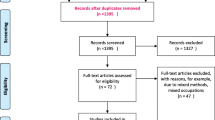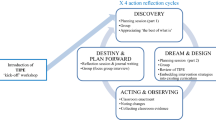Abstract
This article critically appraises a process of recognising prior learning (RPL) using analytical tools from Habermas’ theory of communicative action. The RPL process is part of an in-service training program for health care assistants where the goal is to become a licensed practical nurse. Data about the RPL process were collected using interviews and observations. Through appraising RPL as a social practice, it is held that the process progresses through a ‘caring ideology’. The caring ideology is the foundation that makes it possible to build up health care assistants’ trust in teachers’ authority. In this process, the teachers, by means of strategic actions, become the possessors of (the validity claim) truth. From this starting point, the assistants’ prior experiences are strategically acknowledged in two ways: by affective comments ‘recognising’ their identity/personality and by generating a grade in the courses for which their prior learning is being accredited. The findings show that the lifeworld of these workers is assimilated and colonised through the RPL process and important issues such as power, gender and class are not accounted for. These matters should not be left out in research on caring practices performed by women from low socio-economic groups. These issues must be included if RPL processes are not merely assumed to systematically and uncritically reproduce an existing normative discourse. Based on the RPL practice analysed here, it is proposed that a more reflexive, emancipatory and communicative RPL process could play a central role in the development and enlightenment of health care assistants.
Similar content being viewed by others
Notes
In Swedish ‘undersköterska’. Sometimes also referred to as assistant nurse or licensed vocational nurse.
This relationship is, of course, always more or less unequal.
References
Andersson, P. (2008). National policy and the implementation of recognition of prior learning in a Swedish municipality. Journal of Education Policy, 23(5), 515–531.
Andersson, P., Sjösten, N.-Å., & Ahn, S.-E. (2003). Att värdera kunskap, erfarenhet och kompetens: Perspektiv på validering. [To value knowledge, experience and competence: Perspectives on validation]. Stockholm: Myndigheten för skolutveckling.
Andersson, P., Fejes, A., & Ahn, S.-E. (2004). Recognition of prior vocational learning in Sweden. Studies in the Education of Adults, 36(1), 57–71.
Barker, P. J., Reynolds, W., & Ward, T. (1995). The proper focus of nursing: a critique of the caring ideology. International Journal of Nursing Studies, 32(4), 386–397.
Billett, S. (2008). Learning throughout working life: a relational interdependence between personal and social agency. British Journal of Educational Studies, 55(1), 39–58.
Bourdieu, P. (1986). Distinction: A social critique of the judgement of taste. London: Routledge.
Breier, M. (2005). A disciplinary-specific approach to the recognition of prior informal experience in adult pedagogy: ‘rpl’ as opposed to ‘RPL’. Studies in Continuing Education, 27(1), 51–65. doi:10.1080/01580370500056448.
Brookfield, S. (2001). Repositioning ideology critique in a critical theory of adult learning. Adult Education Quarterly, 52(1), 7–22.
Cameron, C., & Boddy, J. (2006). Knowledge and education for care workers: What do they need to know? In J. Boddy, C. Cameron, & P. Moss (Eds.), Care work: Present and future (pp. 50–70). London: Routledge.
de Jonge, J., Le Blanc, P. M., Peeters, M. C. W., & Noordam, H. (2008). Emotional job demands and the role of matching job resources: a cross-sectional survey study among health care workers. International Journal of Nursing Studies, 45(10), 1460–1469.
Department of Health. (2006a). The regulation of the non-medical healthcare professions: A review by the Department of Health. Leeds: Department of Health.
Department of Health. (2006b). Learning for Change in Healthcare. Available from http://www.wideningparticipation.nhs.uk/pages/report-01.html, accessed 21th of February 2009.
Ellström, E., & Ekholm, B. (2001). Lärande i omsorgsarbete [Learning in care work]. Linköping: Linköping University.
Ellström, E., Ekholm, B., & Ellström, P.-E. (2008). Two types of learning environment. Enabling and constraining a study of care work. Journal of Workplace Learning, 20(2), 84–97.
Fearfull, A. (1997). Training, vocational qualifications and employee performance in care work in the UK. International Journal of Training and Development, 1(3), 158–172.
Fearfull, A. (1998). ‘It’s just like somebody’s turned on a light’: an NVQ success story from the voluntary sector. Health Manpower Management, 24(1), 13–19.
Fejes, A. (2008). Governing nursing through reflection: a discourse analysis of reflective practices. Journal of Advanced Nursing, 64(3), 243–250. doi:10.1111/j.13652648.2008.04800.x.
Fejes, A., & Andersson, P. (2009). Recognising prior learning: understanding the relations among experience, learning and recognition from a constructivist perspective. Vocations and Learning, 2(1), 37–55. doi:10.1007/s12186-008-9017-y.
Foucault, M. (1979). Discipline and punish: The birth of the prison. New York: Vintage Books.
Guess, R. (1981). The idea of a critical theory: Habermas and the Frankfurt school. New York: Cambridge University Press.
Habermas, J. (1975). Legitimation crisis. Boston: Beacon.
Habermas, J. (1984). The theory of communicative action, Volume 1. Reason and the rationalization of society. Cambridge: Polity.
Habermas, J. (1987). The theory of communicative action, Volume 2, Lifeworld and system: A critique of functionalist reason. Cambridge: Polity.
Ministry of Education. (2001). SOU 2001:78. Validering av vuxnas kunskap och kompetens. [Validation of adult’s knowledge and competence]. Stockholm: Utbildningsdepartementet.
Ministry of Health and Social Affairs. (2004). Kommittédirektiv Dir. 2004:162—Stöd till kvalitetsutveckling inom den kommunala vården och omsorgen om äldre genom kompetensutveckling för personalen. [Committee directive Dir. 2004: 162—Support for quality development within the municipal care sector and the care for elderly through competence development of the personnel]. Stockholm: Socialdepartementet.
Ministry of Health and Social Affairs. (2007). SOU 2007:88. Att lära nära. Stöd till kommuner för verksamhetsnära kompetensutveckling inom omsorg och vård av äldre. [To learn close. Support for municipalities activity-close competence development work in the care for elderly]. Stockholm: Socialdepartementet.
Ministry of Health and Social Affairs. (2008). SOU 2008:51. Värdigt liv i äldreomsorgen. [A dignified life in the elderly care sector]. Stockholm: Socialdepartementet.
Skeggs, B. (2001). Formations of class and gender: Becoming respectable. London: Sage.
Somerville, M. (2006). Becoming-worker: vocational training for workers in aged care. Journal of Vocational Education and Training, 54(4), 471–481. doi:10.1080/13636820601005818.
Step for Skills. (2006). Faktablad 5: Kompetensstegens försöksverksamhet. [Information sheet 5: The pilotscheme of Step for skills]. Stockholm: Kompetensstegen.
Waerness, K. (1983). Kvinnor och omsorgsarbete: ett kvinnoperspektiv på människovård och professionalisering. [Women and care work: a female perspective on human care and professionalisation]. Stockholm: Prisma.
Watson, J. (1989) Watson’s philosophy and theory of human caring in nursing. In Conceptual Models for Nursing Practice (pp. 219–236). Norwalk: Appleton and Lange.
Weil, S. W., & McGill, I. (1989). Making sense of experiential learning: Diversity in theory and practice. Buckingham: The Society for Research into Higher Education & Open University Press.
Author information
Authors and Affiliations
Corresponding author
Rights and permissions
About this article
Cite this article
Sandberg, F. Recognising Health Care Assistants’ Prior Learning Through a Caring Ideology. Vocations and Learning 3, 99–115 (2010). https://doi.org/10.1007/s12186-009-9031-8
Received:
Accepted:
Published:
Issue Date:
DOI: https://doi.org/10.1007/s12186-009-9031-8




